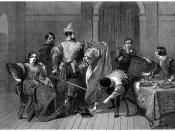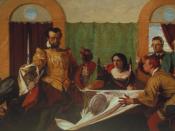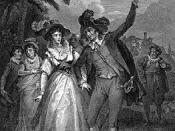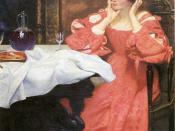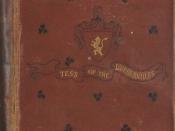"The representation of women varies throughout different texts. This is as a result of the cultural context of the author."The way in which women are depicted in literature can have a diverse effect on the response gained from the receiver. A link can be seen between the portrayal of women in texts and the different cultural aspects of the composer's life and the context in which the text is composed. In specific texts, women are portrayed as the centre of the universe: the core of all that surrounds men, the superior gender with significance in every aspect of life. However, women are often depicted as the inferior gender: having no social standing, no significance of opinion and in the midst of male dominance. These arguments can be seen through of the works of Petrarch in his sonnets, Shakespeare in "The Taming of The Shrew" and Thomas Hardy in "Tess of the d'Urbervilles".
Language plays a significant role in determining the perception of gender throughout texts. Language has the power to reflect current values and cultural contexts or induce new values and cultural conventions. The power of language is depicted through Petrarchan sonnets. Francesco Petrarch was a 14th century Italian poet whom derived the core of his compositions from the courtly love tradition. Petrarch was influenced by the Troubadours and is credited for his impact on the period of 'rebirth', the Renaissance. Petrarch's poetry is based on his unrequited love for his female influence, Laura. Through his sonnet collection, the "Canzoneire", Petrarch alludes to the process of his experience with Laura: firstly his observance of her and his blossoming love for her, then his despise of her through the realization of what he has become because of her.
Petrarchan sonnets depict the ultimate perfection in women: in sonnet 190, Laura is compared to "a doe of purest white" alluding to purity, unexposed to the harsh elements of the world, virtuous and untouched. The liberty of women, in marinating power of being pursued is compared with the captivity under which they held the men who were in their pursuit: their power in love is stronger than their power in society. The dominance of women and their ability to empower men is also signified in Sonnet 3 whereby Petrarch describes himself as being "caught" and "bound" by Laura's love. The fact that Petrarch alludes to his being "unarmed against love's blows" signifies the fact that she had the ultimate control over him: control over his life and the way in which he perceived the world. The domineering factor in Petrarchan sonnets is the way in which love, controlled by a woman is the controlling factor of his life. Petrarch confronts the Medievil view that women had no status and that the opinion was insignificant. The idea of male superiority is challenged throughout Petrarch's sonnets and the inevitable fall of man is not put down to the dominance of women. A much different perspective on women is portrayed through Shakespeare's 'The Taming of The Shrew'.
Shakespeare, 16th century playwright: the most famous composer to date. Shakespeare was also a composer in the midst of the Renaissance, however the way in which women were depicted in his plays differs greatly to the depiction put forth by Petrarchan sonnets. Influenced by the rise in independent thinking and Ovid's metamorphoses, Shakespeare challenged the patriarchal culture and values of his Elizabethan context. Shakespeare contradicted the stereotype of male dominance to an extent but essentially remained in agreement with the longstanding perception of male dominance.
In the taming of the shrew, Katherina and Bianca are two very different siblings with the central theme of their relationship being rampant jealousy. Katherina is described as "â¦Renound in Padua for her scoulding tongue" (1.2.96) whereby she has an evident opinion in contrast with that of the male influences in her life. In Elizabethan society; a woman was perceived as virtuous, chaste and admirable if she withheld any contradictions to the opposite sex's opinions and was in passive acceptance of male domination. This was in complete absence when it came to Katherina. Bianca, however, is portrayed as the chaste one, when hiding behind her father amongst suitors Katherina proclaims freely: "I pray you, sir, is it your will to make a state of me amongst these mates?" (1.1.57-58). Kate is deemed unable to be tamed due to her masculine tendencies.
Shakespeare's portrayal of Katherina as being the 'shrew' in the beginning acts alludes to the type of woman not accepted by his society. Throughout the text, Katherina's taming is seen through her marriage to Petruchio whereby towards the end of the play, Katherina deems Bianca as the shrew for disobeying her male influence. This is evidence of the ultimate dominance of men over women and the longstanding perspective that the male gender is superior. Thomas Hardy's Tess of the d'Urbervilles also portrays this concept of male dominance through the use of the novel form.
Thomas Hardy came from a family whom had prospered but then lost their wealth and nobility which saw the fall of his own family. From this personal experience, the inspiration for the novel Tess of the d'Urbervilles is evident. Hardy was born in 1940 in England and his cultural influence derives from that of the Victorian Era and the move from the pastoralist approach of life to that of the industrial. The vision of women in the Victorian Era was that submissive was always the way. For a woman to challenge a male's opinion was deeply frowned upon and the Victorian Era was very male-orientated. Patriarchal conventions were very strong and Hardy confirmed these concepts.
Tess of the d'Urbervilles is the protagonist of the novel and finds herself in a series of misfortunate events: "the injustice of existence" dominates the novel. Throughout the novel the dominating theme is the power that men posess over women. At times, the dominance of the men is done on purpose: the male being fully aware of his affect on the woman as per exemplified when Alec rapes Tess. Another example of the dominance of men in the novel is whereby Angels neglecting of other suitors leads to them committing suicide. These two examples are evidence that male dominance is at such a level that it can cause colossal consequences such as the loss of life.
Hardy portrays Tess as having a guilty awareness of herself as an object of men's desire: signified by her shaving her eyebrows in order to seem less attractive. Through this Hardy has challenged the tradition view that the desire for female and their desire and sexuality did not exist, or it was only at the expense of male dominance, such as Alec's. Throughout the novel, women are continuously represented as inferior to men and there is constantly a domineering power flowing through men over the women, even in the minutest of ways. An example of this is seen by the love that Angel has for Tess whereby it consumes her life wholly, and unhealthily: ultimately leading to her downfall.
The representation of women changes through the use of different texts and language devices. The way in which women are presented in texts arise as a result of the cultural context in which the composer has been influenced. Texts will always either confirm to and affirm or contrast and challenge the values and attitudes portrayed in the society in which a text is composed and in the society in which it is received. Petrarchan sonnets, Shakespeare's "The Taming of the Shrew" and Thomas Hardy's "Tess of the d'Urbervilles" are all fine examples of the way in which women are portrayed differently in texts. Differential to the text or its influences, women will always be portrayed as submissive and expected to be passive in order to convey society's ideal woman. The submissive, passive acceptance of male domination will always be evident through texts. The question that should be asked is not whether or not it exists, but whether or not the concept of male domination is just.
BIBLIOGRAPHYHardy, Thomas. TESS OF D'UBERVILLES. London: Oxford University Press, 1982.
Shakespeare, William. The Taming of the Shrew (The Pelican Shakespeare). London: Penguin Classics, 2000.
